|
|
|
Sort Order |
|
|
|
Items / Page
|
|
|
|
|
|
|
| Srl | Item |
| 1 |
ID:
158075
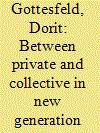

|
|
|
|
|
| Summary/Abstract |
The article examines new generation Palestinian writing in the West Bank, focusing on the ongoing tension between the private and the collective dimensions in literary works there. The works of Palestinian writer of Ramallah, Akram Musallam (b. 1971), serve as test case. The article shows that Musallam's novels preserve a connection to the Palestinian problem and the national-political life on one hand, and create meanings beyond time and place limited by this connection, on the other. The tension between the private and the collective is not only well reflected in Musallam's writings, but in fact constitutes their main pivot and it is embodied in an original and unique inner thematic and stylistic struggle within his writings. Musallam's works serve as an example of the fact that despite recent trends to forsake the collective and focus on the private, Palestinian literature almost always relates, either directly or indirectly, either through creative or less creative means, to collective Palestinian issues.
|
|
|
|
|
|
|
|
|
|
|
|
|
|
|
|
| 2 |
ID:
158068
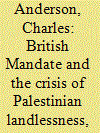

|
|
|
|
|
| Summary/Abstract |
This article examines landlessness among Palestinians as a facet of colonial policy in Mandate Palestine before the 1936 revolt. The growth of what was sometimes called a ‘landless class’ came into official view after the violence of 1929. Subsequent investigations indicated that landlessness was a significant problem and that it threatened to destabilize the Mandate. The effort to ameliorate the crisis of landlessness, however, clashed with the dominant colonial conception of settler developmentalism, the notion that Jews, not Arabs, were the agents of modern economic development in Palestine. The first part of this examination revisits the contest over the 1930 White Paper, focusing on its relationship to the advent of mass landlessness. The rapid defeat of the new policy via the MacDonald letter left the landlessness problem to fester while simultaneously obscuring it. As the situation in the Arab countryside continued to deteriorate, the onset of the fifth aliya temporarily reinforced erroneous assumptions about the potential to rectify the problem through the yishuv's development. By the time mass landlessness was ‘rediscovered’ and new land controls designed to protect Arab smallholders were on their way to promulgation in 1935–1936, the Palestinian countryside was just months away from determined revolt.
|
|
|
|
|
|
|
|
|
|
|
|
|
|
|
|
| 3 |
ID:
158070
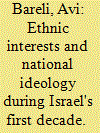

|
|
|
|
|
| Summary/Abstract |
The article offers an empirical foundation through which the electoral behaviour of the new Oriental immigrants into Israel during the 1950s can be interpreted, based on the assumption that their conduct was, in fact, rational. It focuses on the egalitarian wage policy in the important public sector, which led Ben-Gurion and the leaders of Israel's first ruling party, MAPAI, to a confrontation with the European academically educated middle class, and on the political–electoral strategy of MAPAI vis-à-vis the Oriental immigrants during the 1950s electoral campaigns. The article discusses three assumptions: first, that this wage policy was part of the ruling party's attempt to address the interests of the new Oriental working class; second, that this political strategy was publicly discussed, and it addressed the Oriental immigrants’ rational socio-economic calculations for the purpose of securing their political and electoral support; third, that the leaders of nascent Israel and its ruling party presented this policy as a measure towards creating a minimal socio-economic foundation for the process of nation-building during the 1950s.
|
|
|
|
|
|
|
|
|
|
|
|
|
|
|
|
| 4 |
ID:
158074


|
|
|
|
|
| Summary/Abstract |
This article is based on the hypothesis that the Egyptian institutional media played an active role in the Egyptian ‘Arab Spring’ revolution in 2011 and analyzes how Egypt's official newspapers constructed and presented a moderate and positive image of the Muslim Brotherhood (hereinafter the Brotherhood) despite the fact that they had labeled the Brotherhood ‘the outlawed movement’ a year earlier. In order to examine whether their attitudes changed after the downfall of the Mubarak regime, a critical discourse analysis of newspaper texts has been made of the news columns written throughout 2011 of two of the most popular Egyptian newspapers – al-Ahram (n = 115) and al-Gumhuriyya (n = 94) both of which identify with the Egyptian government's official policy. In addition, an analysis made of three of the Brotherhood's publications (n = 72) (N = 281) revealed that the Brotherhood exploited the printed media not only to replace the regime but also to gain control of its narrative. Ultimately, by controlling the shaping of public opinion, the media contributed to the drawing of a parallel between the motivation that formed the basis of the mass protest and the Brotherhood's agenda.
|
|
|
|
|
|
|
|
|
|
|
|
|
|
|
|
| 5 |
ID:
158072


|
|
|
|
|
| Summary/Abstract |
This article indicates that Suleymani tribes, which were relocated from Diyarbekir region en masse to the newly conquered territories of northern Ottoman-Iranian frontiers after the mid-sixteenth-century, created a shift in the administrative and ethnic structure of the region. Although the roles of tribes were mostly seen as subordinate to the power of the Kurdish emirs, this study shows that the chiefs of Suleymani tribes, more specifically Besyan and Heyderan, became the rulers of the newly captured Safavid territories and they did not recognize the authority of their own Suleymani emirs. The writer focuses on this migration and discusses that the relocated Suleymani tribes preserved the collective memory of their migration during the nineteenth-century and their perception shaped the creation of a tribal myth, Mil-and-Zil, after the Ottoman central government disinherited the Kurdish emirs during the mid-nineteenth-century. Suleymani tribes' migration, collective memory and mythification of their own identities show that tribes were not passive subjects but they were in fact at the center of the developments of the Ottoman eastern frontier.
|
|
|
|
|
|
|
|
|
|
|
|
|
|
|
|
| 6 |
ID:
158071


|
|
|
|
|
| Summary/Abstract |
This article focuses on Iraqis in Jordan who intend to migrate further. It is maintained that the distinction between forced and voluntary migrations and the formal labels used to categorize migrants do not express the complexity of movements within and from the region. It is argued that movements out of Iraq and into Jordan, and further migrations to the West, are underpinned by more than one reason though triggered by force or violence. Indeed, the reasons urging movements of Iraqis in our study took different turns as people got to particular places and faced the context of reception there. We have identified challenges to Iraqi refugee integration and related them to the variety of intended and unintended fragmented movements that go together with multiple changes in formal migrant statuses. The article thus contributes to discussions on mixed migrations and fragmented migrations in the region and portrays the agency of Iraqis in migrating amidst the structural factor of force. The article also provides valuable contributions to discussions on fragmented journeys of would-be asylum seekers in the West.
|
|
|
|
|
|
|
|
|
|
|
|
|
|
|
|
| 7 |
ID:
158069
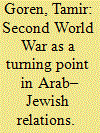

|
|
|
|
|
| Summary/Abstract |
One of the gravest outcomes of the period of the Arab revolt was the heavy economic damage caused to the Arab community. Jaffa, which suffered greatly in the years 1936–1939, sought to rebuild and restore the city to its status as a leading economic center in Palestine. This need intensified still more with the outbreak of the Second World War. Hence, it was in Jaffa's evident interest to bring about an improvement in relations with Tel Aviv and with Jews generally. Problems regarding the proper management of economic life in wartime exercised the Jewish settlement also; therefore, Jewish–Arab cooperation steadily grew in this period. The article gauges the measure of this cooperation and the nature of the ties that consolidated between Arabs and Jews during the war. The situation of Jaffa and Tel Aviv serves as a test case well exemplifying the force of the subsequent change in relations between Jews and Arabs in Palestine.
|
|
|
|
|
|
|
|
|
|
|
|
|
|
|
|
| 8 |
ID:
158073
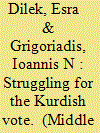

|
|
|
|
|
| Summary/Abstract |
This study explores the competition for Turkey's Kurdish vote through the instrumentalization of religion, ethnicity and victimhood in political competition. This becomes possible through the study of rally speeches of the Justice and Development Party (Adalet ve Kalkınma Partisi – AKP), the pro-Kurdish Peace and Democracy Party (Barış ve Demokrasi Partisi – BDP) and the Peoples’ Democratic Party (Halkların Demokratik Partisi – HDP), in Turkey's June 2011 and June 2015 general elections. The AKP campaigns framed the resolution of the Kurdish issue along with an updated version of the ‘Turkish Islamic Synthesis’. The issue of ethnicity was toned down in contrast to the idea of common victimhood of pious Turkish and Kurdish Muslims in republican Turkey. On the other hand, the BDP/HDP moved from a more ethnic-oriented and exclusive identity approach in 2011 to a more inclusive, liberal and extrovert agenda based on a civic definition of Turkish national identity in 2015. Religion and victimhood appear as the two most enduring symbolic resources for political party mobilization.
|
|
|
|
|
|
|
|
|
|
|
|
|
|
|
|
|
|
|
|
|